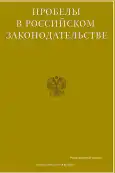Criminal Procedure Features of Interrogation of a Minor Injury and Witness
- Authors: Berova J.M.1, Tutukov A.Y.1
-
Affiliations:
- North Caucasus Institute for Advanced Studies (branch) of the Krasnodar University of the Ministry of Internal Affairs of Russia
- Issue: Vol 15, No 7 (2022)
- Pages: 165-169
- Section: Articles
- URL: https://bakhtiniada.ru/2072-3164/article/view/147775
- ID: 147775
Cite item
Abstract
Full Text
##article.viewOnOriginalSite##About the authors
Juliet Mikhailovna Berova
North Caucasus Institute for Advanced Studies (branch) of the Krasnodar University of the Ministry of Internal Affairs of Russia
Email: berova-d@yandex.ru
Dr.Sci.(Law), Associate Professor, Police Colonel, Deputy Head Nalchik, Russia
ALbert Yurievich Tutukov
North Caucasus Institute for Advanced Studies (branch) of the Krasnodar University of the Ministry of Internal Affairs of RussiaCand.Sci.(Law), Associate Professor, police colonel, Associate Professor of Law Enforcement activities organization Department Nalchik, Russia
References
- Appeal ruling of the Judicial Collegium for Criminal Cases of the Supreme Court of the Russian Federation dated April 16, 2019 No. 92-APU19-3sp. The document has not been published. Access from ATP "ConsultantPlus".
- Dolzhenko N.I., Kupryashina E.A. Features of the interrogation of minors in criminal proceedings // Bulletin of the Voronezh State University. Series: right. 2022. No. 1 (48). pp. 257-266.
- Leonova K.I., Novikova E.A., Didenko V.I. On the question of the production of interrogation of juvenile suspects (accused) // Gaps in Russian legislation. 2019. No. 5. P. 168-171.
- Markovicheva E.V. Participation of a teacher and psychologist in the interrogation of juvenile victims and witnesses: changes in legislation // Issues of juvenile justice. 2022. No. 2. S. 2-4.
- Matamarov A.N. Features of preparation for interrogation of minor victims and witnesses // Law and State: Theory and Practice. 2022. No. 8 (212). pp. 141-143.
- Tokareva E.V., Chasovnikova O.G., Vasiliev D.V. Criminal procedural and forensic features of the preparation and production of interrogation of minors // Eurasian legal journal. 2021. No. 6 (157). pp. 349-350.
- Tutukov A.Yu., Berova D.M. Criminal procedural features of the interrogation of minors during the preliminary investigation // Gaps in Russian legislation. 2019. No. 2. S. 181-183.
- Chernetsova M.V. Moral aspects of the interrogation of minors in the Russian criminal process // Bulletin of the Chechen State University. A.A. Kadyrov. 2022. No. 2 (46). pp. 135-140.
Supplementary files








